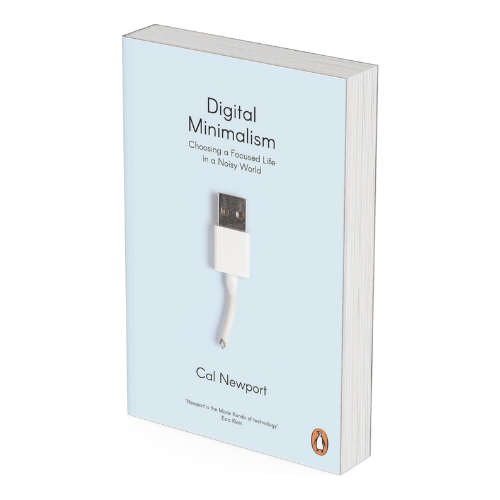Digital Minimalism
by Cal Newport

The Author
Cal Newport is a distinguished author, computer science professor at Georgetown University, and thought leader in the field of the intersection of digital technology and culture. He is renowned for his research on productivity, digital minimalism, and profound work and possesses a Ph.D. from MIT. Newport is the author of numerous bestselling books, such as “Deep Work” and “So Good They Can’t Ignore You.” His writings have been featured in prominent publications such as The New York Times and The Wall Street Journal.
Summary of “Digital Minimalism”
“Choosing a Focused Life in a Noisy World” promotes the deliberate and controlled application of technology. The book is organised according to the premise that our lives are cluttered with digital distractions, and by minimising these distractions, we can concentrate on what is truly important.
Detritus is Expensive.
Digital detritus detracts from significant relationships and activities.
Optimisation is Critical.
We must exercise caution when employing technology, guaranteeing that it aligns with our objectives and principles.
Intentionality is Satisfying.
It is intentionally selecting how to interact with technology that results in increased satisfaction and fulfilment.
The Digital Declutter.
30-day “digital declutter” procedure is implemented, during which individuals refrain from using optional technologies. They are encouraged to investigate and rediscover activities that offer genuine gratification during this time.
After the 30-day hiatus, technologies are selectively reintroduced, contingent upon their ability to enhance one’s quality of life.
Digital minimalism practices.
Newport emphasises the significance of solitude by advocating for activities such as composing letters to oneself, taking lengthy walks, and leaving the phone at home.
Refrain from clicking the “Like” button: Promotes more profound, meaningful interactions than superficial social media interactions. He also promotes pursuing high-quality leisure activities that offer intrinsic satisfaction, such as physical interests and in-person interactions.
Newport discusses the importance of avoiding mobile versions of applications and prioritising real-world interactions to resist the prevalent influence of social media.
Matthew Bartolo’s Thoughts on “Digital Minimalism”.
Reading “Digital Minimalism” has significantly altered my perspective on the use of technology in both my personal and professional life. Newport’s assertion that disorder is expensive is profoundly resonant with my experiences as a psychotherapist. Daily, I encounter clients who are overcome by digital distractions, which have a detrimental impact on their mental health and overall well-being. This book emphasises the significance of being deliberate in our approach to technology, ensuring that it is consistent with our objectives and values.
Utilising the Digital Decluttering Method
The 30-day digital declutter concept is particularly influential. In my professional experience, I frequently advise clients to take vacations from digital devices to enhance their focus and alleviate anxiety. Newport’s structured approach facilitates this process. By refraining from optional technologies, individuals can rediscover meaningful activities and relationships that contribute to a fulfilling existence. This approach cleanses the mind and establishes a basis for a more positive relationship with technology.
Another critical import is Newport’s emphasis on solitude and its advantages. Solitude has become an exceedingly scarce commodity in a perpetually interconnected society. Nevertheless, it is indispensable for mental clarity and self-reflection. I have begun integrating seclusion practices into my therapeutic recommendations, such as advising clients to spend time alone without digital distractions. This enables them to reestablish a connection with their interior thoughts and emotions, resulting in improved mental health.
The significance of reclaiming high-quality leisure activities is one of the most significant insights from the book. Newport recommends participating in intrinsically rewarding activities, such as physical interests and face-to-face interactions. This is consistent with my conviction that engaging in meaningful, offline activities can be therapeutic. Individuals can improve their overall satisfaction and well-being by transitioning from inert digital consumption to active, enriching experiences.
Newport’s analysis of superficial social media interactions and his advocacy for more profound, significant conversations are particularly pertinent. As a therapist, I frequently observe the detrimental effects of social media on relationships. By encouraging clients to prioritise in-person interactions and conversations, I can achieve stronger, more gratifying relationships. This method alleviates loneliness and cultivates a sense of community and inclusion.
Using the principles of “Digital Minimalism,” I motivate my clients and colleagues to:
Conduct a Digital Declutter
After a 30-day hiatus from optional technologies, selectively reintroduce them based on their value.
Embrace Solitude
Allocate consistent time for reflection and rejuvenation, free from digital interruptions.
Participate in High-Quality Leisure
Emphasise activities that foster well-being and provide intrinsic satisfaction.
Strengthen Social Interactions
Emphasise meaningful connections and face-to-face conversations over superficial social media interactions.
Be Intentional with Technology
Utilise technology in a manner that aligns with your values and objectives, thereby preventing the accumulation of unnecessary digital detritus.
In summary, “Digital Minimalism” by Cal Newport provides valuable insights into managing our relationship with technology in a manner that enhances rather than detracts from our lives. Newport’s principles and practices are highly beneficial for promoting mental fitness and well-being in my capacity as a psychotherapist and trainer. By adopting digital minimalism, individuals can reclaim their time and focus and ultimately lead more fulfilling lives.
Digital Minimalism
by Cal Newport

The Author
Cal Newport is a distinguished author, computer science professor at Georgetown University, and thought leader in the field of the intersection of digital technology and culture. He is renowned for his research on productivity, digital minimalism, and profound work and possesses a Ph.D. from MIT. Newport is the author of numerous bestselling books, such as “Deep Work” and “So Good They Can’t Ignore You.” His writings have been featured in prominent publications such as The New York Times and The Wall Street Journal.
Summary of “Digital Minimalism”
“Choosing a Focused Life in a Noisy World” promotes the deliberate and controlled application of technology. The book is organised according to the premise that our lives are cluttered with digital distractions, and by minimising these distractions, we can concentrate on what is truly important.
Detritus is Expensive.
Digital detritus detracts from significant relationships and activities.
Optimisation is Critical.
We must exercise caution when employing technology, guaranteeing that it aligns with our objectives and principles.
Intentionality is Satisfying.
It is intentionally selecting how to interact with technology that results in increased satisfaction and fulfilment.
The Digital Declutter.
30-day “digital declutter” procedure is implemented, during which individuals refrain from using optional technologies. They are encouraged to investigate and rediscover activities that offer genuine gratification during this time.
After the 30-day hiatus, technologies are selectively reintroduced, contingent upon their ability to enhance one’s quality of life.
Digital minimalism practices.
Newport emphasises the significance of solitude by advocating for activities such as composing letters to oneself, taking lengthy walks, and leaving the phone at home.
Refrain from clicking the “Like” button: Promotes more profound, meaningful interactions than superficial social media interactions. He also promotes pursuing high-quality leisure activities that offer intrinsic satisfaction, such as physical interests and in-person interactions.
Newport discusses the importance of avoiding mobile versions of applications and prioritising real-world interactions to resist the prevalent influence of social media.
Matthew Bartolo’s Thoughts on “Digital Minimalism”.
Reading “Digital Minimalism” has significantly altered my perspective on the use of technology in both my personal and professional life. Newport’s assertion that disorder is expensive is profoundly resonant with my experiences as a psychotherapist. Daily, I encounter clients who are overcome by digital distractions, which have a detrimental impact on their mental health and overall well-being. This book emphasises the significance of being deliberate in our approach to technology, ensuring that it is consistent with our objectives and values.
Utilising the Digital Decluttering Method
The 30-day digital declutter concept is particularly influential. In my professional experience, I frequently advise clients to take vacations from digital devices to enhance their focus and alleviate anxiety. Newport’s structured approach facilitates this process. By refraining from optional technologies, individuals can rediscover meaningful activities and relationships that contribute to a fulfilling existence. This approach cleanses the mind and establishes a basis for a more positive relationship with technology.
Another critical import is Newport’s emphasis on solitude and its advantages. Solitude has become an exceedingly scarce commodity in a perpetually interconnected society. Nevertheless, it is indispensable for mental clarity and self-reflection. I have begun integrating seclusion practices into my therapeutic recommendations, such as advising clients to spend time alone without digital distractions. This enables them to reestablish a connection with their interior thoughts and emotions, resulting in improved mental health.
The significance of reclaiming high-quality leisure activities is one of the most significant insights from the book. Newport recommends participating in intrinsically rewarding activities, such as physical interests and face-to-face interactions. This is consistent with my conviction that engaging in meaningful, offline activities can be therapeutic. Individuals can improve their overall satisfaction and well-being by transitioning from inert digital consumption to active, enriching experiences.
Newport’s analysis of superficial social media interactions and his advocacy for more profound, significant conversations are particularly pertinent. As a therapist, I frequently observe the detrimental effects of social media on relationships. By encouraging clients to prioritise in-person interactions and conversations, I can achieve stronger, more gratifying relationships. This method alleviates loneliness and cultivates a sense of community and inclusion.
Using the principles of “Digital Minimalism,” I motivate my clients and colleagues to:
Conduct a Digital Declutter
After a 30-day hiatus from optional technologies, selectively reintroduce them based on their value.
Embrace Solitude
Allocate consistent time for reflection and rejuvenation, free from digital interruptions.
Participate in High-Quality Leisure
Emphasise activities that foster well-being and provide intrinsic satisfaction.
Strengthen Social Interactions
Emphasise meaningful connections and face-to-face conversations over superficial social media interactions.
Be Intentional with Technology
Utilise technology in a manner that aligns with your values and objectives, thereby preventing the accumulation of unnecessary digital detritus.
In summary, “Digital Minimalism” by Cal Newport provides valuable insights into managing our relationship with technology in a manner that enhances rather than detracts from our lives. Newport’s principles and practices are highly beneficial for promoting mental fitness and well-being in my capacity as a psychotherapist and trainer. By adopting digital minimalism, individuals can reclaim their time and focus and ultimately lead more fulfilling lives.
“The only way to make sense out of change is to plunge into it, move with it, and join the dance.”
Recent Thoughts
When Love Turns to Hate: Why Justice Must Stay in the Courtroom and Not Online
As a therapist working closely with couples and individuals in high-conflict relationships, I have seen the full emotional arc of love, from intimacy
Stress at the Top
Why Leadership in Malta is More Isolated Than You Think We often picture business leaders as confident, driven, and in control. They make



